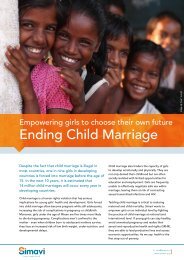1wE4FuZ
1wE4FuZ
1wE4FuZ
Create successful ePaper yourself
Turn your PDF publications into a flip-book with our unique Google optimized e-Paper software.
The influence of hierarchies and social norms on themanagement of menstruationMenstruation is a taboo subject in the geographical area of the study. Thus, womenfind it very difficult to talk about menstruation, not only with men but also withtheir daughters and even with other women.Relationships are very hierarchical in the Kedougou region, firstly betweenmen and women, then in the home between parents and children and boys andgirls. Households are headed by men. The wife is subordinate to her husband.This submission is sometimes extreme in rural areas, where the wife may not voicean opinion under any circumstances.Men have no knowledge of the specific needs of women who are menstruating.This situation makes communication difficult within the couple, especially when thewife has to buy sanitary pads or go to hospital for a menstruation-related infection.It is the same for girls who, when they have specific needs during their periods,approach their mothers rather than their fathers. Mothers who have no incomediscourage their daughters from using commercial sanitary products and use plants,potions and talismans to deal with infections.These relationships of subordination create communication difficulties betweenmother and daughter that persist throughout the girls’ course of menstruation, aswill be shown later.Among the girls and women surveyed, 70% consider periods to be dirty. They givemany reasons for this: 29––“The smell is bothersome”––“It is bodily waste”––“It is a disease coming out”––“It’s all the filth from a woman’s body coming out.”It is largely accepted by the women and girls surveyed that periods are wastedisposed once a month by the body. This would explain why women cannot prayduring this period since they are considered to be unclean.The term “I am not clean” is often used in local languages to denote that a woman ismenstruating. In the Fula community the following term is used for having periods:“mido woupoudé” (I’m doing the washing). Adolescents say “mido yiidé Jack Bauer” 30(I can see Jack Bauer), a more discreet expression that men, boys, grandmothers andeven mothers cannot decrypt. Indeed the same communication difficulties betweenmother and daughter experienced at menarche continue every month so that girlsoften hide their menstrual status from their mothers.Outcomes of the studyThe participants in focus groups and individual interviews gave different expressionsand euphemisms to denote periods (see table 10).29 Excerpts from focus groups in Kedougou, Saraya and Bandafassi.30 A character in the American series “24”, very popular among young people.37



